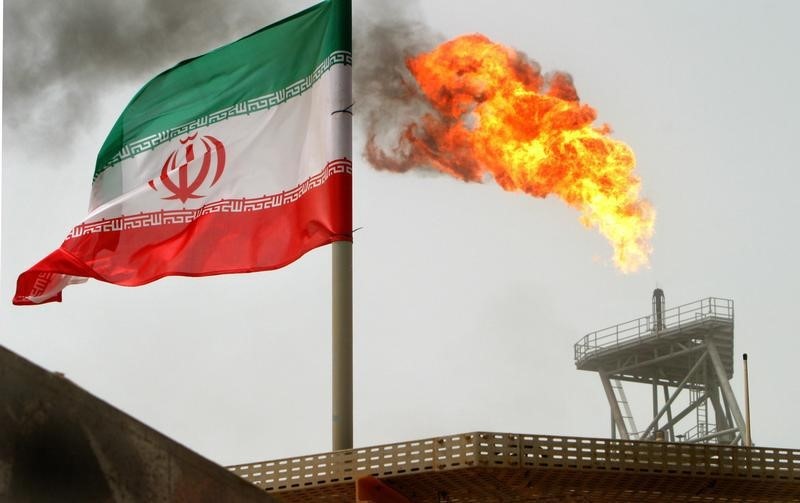(Bloomberg) -- Iran and the U.S. are close to reviving a landmark 2015 nuclear deal that was jettisoned by the Trump administration.
Since the talks started nearly a year ago, a more hardline leadership has taken power in Tehran and a spate of shipping and drone attacks have shaken the Persian Gulf. More recently, Moscow’s invasion of Ukraine has sent oil prices soaring.
That’s given added urgency to efforts to revive the accord between Tehran and world powers as it could release tens of millions of barrels of Iranian crude oil onto global markets within months.
Here’s a snapshot of what else it could bring:
Oil
Under the deal, the U.S. will waive sanctions on purchases of Iranian oil. Trump suspended the waivers entirely in 2019, effectively reviving sanctions on all countries trying to import Iranian crude. As with the original accord, the restored agreement is not expected to lift a historical ban on U.S. imports of Iranian oil, but it means countries will be able to buy it without fear of being hit by secondary sanctions. It may take roughly two months from when the deal is agreed for Iran to start selling oil on international markets.
Prior to Trump’s ban, Iran’s main customers were China, India, South Korea, Japan, Turkey, Taiwan, Italy and Greece. Those Asian countries may be among the first to restock on Iranian supplies.
Iran has tens of millions of barrels of oil stored on tankers it could dispatch to customers quickly. In the meantime, it would ramp up production from fields that have been fully or partly shut.
Formerly OPEC’s No. 2 producer, Iran could restore about 1 million barrels of daily crude production within months of a deal, according to traders and analysts. It could be back to full capacity of about 3.7 million barrels a day by next year.
Banking
The Trump administration’s sanctions on Iran’s banking system went beyond the penalties that had come prior to the 2015 deal. Most of Iran’s private and state-run banks were subject to an additional layer of penalties related to terrorism and missile activity. The U.S. also applied terrorism sanctions on the Central Bank of Iran in 2019 after linking Tehran to an attack on a major Saudi oil complex.
The restrictions made even the purchase of humanitarian goods -- which are legally exempt from sanctions -- very difficult. Iranians have also struggled with remittances, while billions of dollars of payments for oil sales have been trapped in overseas accounts.
Under a revived deal, those funds are expected to be released quickly. Iran will regain access to the SWIFT international messaging system for banks. Theoretically, it should be able to resume non-humanitarian trade. But there are still a raft of sanctions, related to human rights and Iran’s ballistic missile program, that still apply to many entities and aren’t covered by the nuclear deal.
Nuclear
Iran made significant advances with its nuclear program after the U.S. reimposed and toughened sanctions, with Tehran coming close to producing the fuel needed for a nuclear weapon. Under the revived deal, Iran is expected to return to limiting uranium enrichment levels to 3.67%, the level needed for nuclear power generation.
Iran’s stockpiles of uranium enriched close to weapons-grade levels would be transferred out of the country and the advanced centrifuges that it installed for uranium processing will be dismantled. Iran has also agreed to resolve a contentious investigation into historical atomic activity with the International Atomic Energy Agency by late May -- an indication that an agreement to ease sanctions could be fully implemented by the summer.
Regional stability
One of the key differences between this round of talks and the 2015 negotiations is that Iran has made efforts to engage its regional neighbors, working to mend ties with both Saudi Arabia and, more crucially, the United Arab Emirates -- a vital trade partner for Tehran. A spate of attacks this year, including on the UAE and claimed by Iranian-backed Houthi fighters in Yemen, threatened this diplomacy, but does not appear to have derailed it.
Saudi Arabia and the UAE backed Trump’s “maximum pressure” campaign against Iran. The Iran-U.S. standoff escalated with attacks on oil shipments, the strike on the Saudi oil facility and culminated in the U.S. assassination of Iran’s most powerful general. Diplomats say a restored deal could reduce the chances of another escalation and help ease divides in regional conflicts like the war in Yemen.
©2022 Bloomberg L.P.
